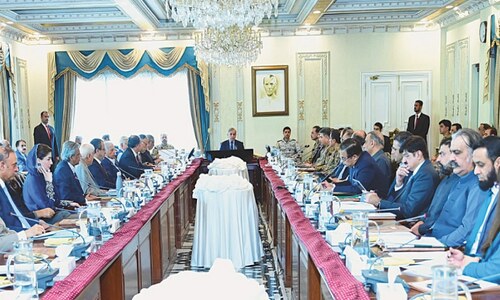 ISLAMABAD, June 22: Pakistan and India on Thursday reaffirmed the sacrosanct status of the Indus Waters Treaty of 1960, which should be respected but made no headway in resolving the 22-year old dispute over the Wullar Barrage / Tulbul Navigational Project.
ISLAMABAD, June 22: Pakistan and India on Thursday reaffirmed the sacrosanct status of the Indus Waters Treaty of 1960, which should be respected but made no headway in resolving the 22-year old dispute over the Wullar Barrage / Tulbul Navigational Project.
The two-day secretary level talks on Wullar Barrage, part of the third round of composite dialogue, would conclude on Friday with a joint statement. Indian Water Resources Secretary J. Hari. Narayan is leading a 13-member delegation while Water and Power Secretary Ashfaq Mehmood heads the Pakistani side.
A senior official told Dawn that the two sides had held two rounds of discussions and explained their viewpoints. He said that the two sides reiterated their respective positions but talks were held in very cordial atmosphere. “The two sides were unanimous that (the Indus Waters) Treaty is sacrosanct and must be respected,” the official said.
The two sides have so far held a total of 11 rounds of talks on Wullar Barrage dispute.
The dispute emerged in 1984 after India planned to build a barrage on outfall of the Jhelum River in the occupied Kashmir with a storage capacity of 300,000 acres feet without informing Pakistan, as was required under the treaty.
India started building the dam, which was around 439 feet high and 40 feet wide barrage in the Baramullah district to create a link with Srinagar but halted its construction in 1987 when Islamabad had opposed the move.
Pakistan maintained that the project violated its rights as a lower riparian country granted by the Indus Waters Treaty. However, India has not abandoned the project and says the barrage is aimed at facilitating navigation between Baramullah and Srinagar through the Wullar Barrage in the Jammu and Kashmir.
Pakistan says that the Indus Water Treaty allowed a storage capacity of only 10,000 acre-feet while the project envisaged storage of 324,000 acre-feet, which was 32 times what the treaty allowed, according to Pakistan.
Islamabad fears the barrage would interfere with the flow of Jhelum River water into Pakistan, affecting its agro-based economy. India insists that the barrage would not hinder water’s flow into Pakistan.
Although the treaty grants Pakistan the water rights on the Chenab, Jhelum and Indus, it allows India a limited use of these rivers.
“Sincerity leads to solution of any dispute and we hope that we will be able to reach a rational solution to the issue at the end of the talks,” an official said.
He said the two sides discussed the project’s technicalities and it was hoped that talks would reach some tangible outcome on Friday.
The Pakistani side reiterated its position that no increase should be made in the height of the dam and it should remain at the point at which it was suspended in 1987, a source told Dawn.
He said Pakistan could not discuss anything which was beyond the scope of the treaty.
He said issues like the Wullar Barrage were not easy to resolve.














































Dear visitor, the comments section is undergoing an overhaul and will return soon.